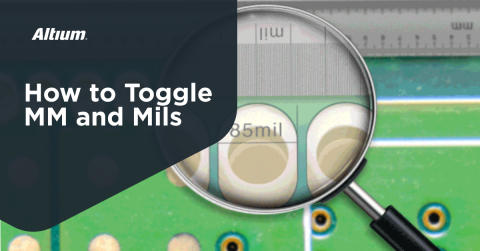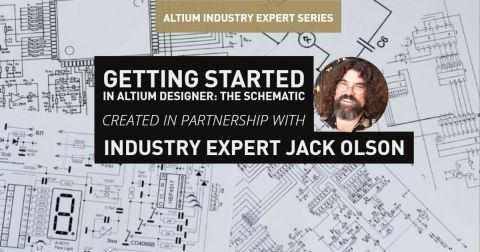Improving Your PCB Design Engineering CV and Resume

In the past, when looking for a new job, I have typically been able to find one within a week. I put this down to my excellent skills and awesome experience. It wasn’t until I rose to a position where I was involved in selecting candidates and wading through CVs that I realized this was probably more down to my CV getting my foot in the door rather than any particular experience or skillset that I had. I’m sure those did help, though. By contrast, 95% of engineering CVs are pretty dreadful for a recruiter to have to look at, especially if the recruiter has a non-technical background. Each time I’ve been involved in the hiring process, this opinion has been further reinforced. Your CV could be costing you your dream job or preventing you from getting back into employment as companies start looking to rebuild their workforces post-COVID. While writing this article, many countries are experiencing a big second wave of virus infections, with a lot more lockdowns and business closures as a result. However, this article is not COVID-centric. If you’re reading this article far into the post-COVID future, I hope the advice will still be relevant in helping you improve your job search.
In the past, I’ve talked about getting started with freelance engineering. I feel that my long experience of freelancing alongside my day job has helped me build my CV. Much of the advice for getting started with freelancing also applies when looking for a permanent position.
Common Issues with Applications
Speaking as someone involved in, or in charge of, the recruitment process, there’s some really critical information I need to know before I say, “this person looks fantastic; let’s give them a call.” I’ve looked through many CVs that make it nearly impossible to figure out what skills or experience the applicant actually has. This is tragic as I’m probably not going to take the time to find out if I already have other strong candidates in contention. Many candidates also clearly did not read the job description and take a “quantity over quality” approach when looking for a new job.
Beyond the contents of the application, also consider the file format. Personally, I’d prefer to see a PDF from every single candidate for their cover letter and resume. Microsoft Word, Open Office, and Google Docs can save as PDF just as effortlessly as you can save to their native formats. A PDF is software and platform-neutral - the text will always display correctly no matter what fonts or page size, or layout you use. Most web browsers can open a PDF these days without needing Acrobat or any other PDF reader installed - the same can’t be said for a Microsoft Word document. I’ve worked at companies where I didn’t have Microsoft Word installed on my computer, so I’d open Word Document CVs in Notepad++ and make do. It wasn’t pretty. You can go with the argument of “but everyone has Word,” however, your job as an applicant is to make life as easy for the recruiter as possible, so they see you as the superstar you are. PDF happens to be the most platform-neutral format available for you to express your awesomeness in.
The Employment History CV
The majority of CVs I pass over are simply listings of past employers, with perhaps a sentence or two describing the applicant’s duties in incredibly broad terms. This tells me nothing about the candidate or what their skills are. If this is your CV, you need to make some changes, but we’ll get to that later.
The Academic CV
It’s not uncommon to see recent graduates, especially with Masters or Doctoral degrees, focus heavily on their education/papers in a similar way to “The Employment History CV.” Long listings of published papers that I might not easily find or have access to, along with broad descriptions of your studies, will not tell me about your skill set and experience. I completely understand that sometimes this is used to mask a lack of practical experience outside of academia. Still, despite what you may think - those studies have given you valuable skills and knowledge beyond the academic world. The list of papers and courses is fantastic to include, but I find on its own it’s probably not going to sell the candidate to me unless they also have a strong CV before the papers’ listing.
The Wrong CV
When a candidate has strong skills in multiple areas, such as firmware development and schematic design/layout, it is all too familiar that they send the wrong CV. I’ve had vacancies for electronics engineering positions inundated with CVs from software engineers that, when you dig deep enough, do have significant experience relevant to the job. However, the CV is so focused on their software engineering experience that they look at first sight totally inappropriate to the job. If you have multiple diverse skill sets, make sure you have different CVs focused on each of your skill sets! Suppose we’re looking for a specific skill set, and the resume makes the candidate look like they are highly skilled in a different area. In that case, we’re probably going to put the resume aside unless we also have an open position in that other area.
The Wrong Cover Letter
I would say that less than a quarter of the cover letters I’ve seen are for the job posted. Perhaps around a third are not even for a job in the same industry. A cover letter is your way to tell the recruiter how your skill set specifically relates to their job advert. Suppose I’m posting a job for an engineer with oil and gas experience, and the cover letter refers to an appointment with an airline (true story). In that case, that candidate will probably end up in my rejected pile after I’ve read the first sentence of their cover letter. As a recruiter, I find it slightly insulting that the candidate couldn’t take the time to check they are uploading the right file, or worse, believe the candidate doesn’t have the necessary attention to detail. I’ll admit I’ve been the guy who sends the wrong cover letter in the past - it’s an easy mistake to make, particularly when you’re applying for many different positions.
No Cover Letter
Not having a cover letter isn’t the end of the world if you have a great CV that’s targeted at the job/industry/position type in question. However, it’s often a missed opportunity for the applicant, assuming they send the right cover letter! When looking through dozens of applications, a cover letter is the applicant’s opportunity to tell me about themselves. To show how their skills relate to the posted job - it’s there to entice me into looking deeper at them, taking a look at their CV, and wanting to know more about them. It’s your chance to form a personal connection with me, make me want to hire you, or at least talk to you. With no cover letter, if the resume does not contain the information I need to evaluate the candidate, it is a guaranteed rejection without even thinking about calling the candidate.
Incomplete Questionnaire
Some job sites have a questionnaire that needs to be filled out when applying for a vacancy. Personally, as a candidate, I hate them. They try to box my skill set into filling checkboxes that might make me look like a poor candidate when I feel I’m a great fit for the job. Unfortunately, if you don’t complete the questionnaire, your application might be rejected by the job website and never even be seen by a human. On Indeed.com, for example, there is a setting to automatically reject candidates who don’t meet the required criteria determined by the tick boxes, which is a real shame. If the company/recruiter has listed questions and you don’t complete them, you might be out of the running before you even get started.
The same goes for other skills tests and the like which some job sites throw at you, such as an automated phone interview. I’ve had the job specialists at Indeed, who help companies posting their jobs get more applicants, suggest adding the phone interview as it’s a great way to get to hear the candidate’s voice and let them tell you more about themselves. As a recruiter, it also allows me to assess their English verbal skill level (when that has been important) and their confidence when talking about their skills. The questions are the same for every job and are non-technical, yet only perhaps 10% of candidates bother to complete them.
Wild Exaggeration on the Questionnaire
I’m sure some candidates know that if they don’t meet the requirements, their application may not even be read, so they might stretch their experience and skills a little to meet the expectations for required/desired skills - but try to keep it realistic. I’ve had 22-year-old candidates who are recent graduates claim 15 years of experience with PCB design and Altium Designer®. They certainly are passionate people who may well have been playing with STEM/STEAM toys from an early age. Still, there was absolutely nothing in their CV or cover letter that made me feel like they had any electronics design experience before high school, never mind as a 7-year-old. If every question has a highly inflated response for years of experience, I’m likely to assume the candidate isn’t worth wasting my time on. Years of experience are not all equal. At times, a candidate who falls short of a desired amount of experience by a few years might still be more skillful and experienced than someone who has been coasting through the field for far longer. A good recruiter will not rule out candidates who don’t meet their desired qualifications if they make up for the deficiency in their cover letter/CV. Failing to meet the “desired” experience criteria will not get you automatically rejected on job sites, though failing to meet a “required” criteria certainly could.
My Ideal CV/Resume
We’ve talked about disaster CVs, so what makes the ideal CV? My resume is like a freelancing portfolio, and I’ve only ever received a few others like it from applicants - they almost always get a call or at least shortlisted. I start my CV practically like a generic cover letter, with a bit about myself and my strongest skills, plus any hobbies relevant to the industry, and the like. It’s a way to converse with the recruiter. This introduction to my CV is also where I’ll list any particularly expensive or interesting software licenses that I own (such as Visual Studio/Altium Designer/SolidWorks).
Skills List
As a recruiter, this is critical for me - I need to know what you can do, not what you have done. Having a skills matrix or listing can let me immediately see if you’re a fantastic candidate without having to trawl through your job history to try to piece together your skill set. Therefore, before getting into my job history, I list all my skills relevant to the industry as bullet points and a short description to expand upon each skill. These skills can also include the specialized software packages you use. If the employer uses Altium Designer or Ansys HFSS, then knowing the candidate is already up to speed on that software and won’t need to be trained can be highly advantageous.
If you’re great at PCB design, detail the highest frequencies you’ve routed or any specific challenging protocols or EM mitigation practices you’ve implemented. Perhaps detail the largest layer count you’ve worked with or any other specialized electrical or fabrication technologies you have experience with. I’ve seen some applications with star ratings provided by candidates of how skilled they feel they are at specific tasks, software packages, etc. I loved these candidates. You are essentially distilling down your employment/academic history into something simple for a recruiter to use to evaluate you against.
Suppose you have a GitHub/CircuitMaker/Upverter/StackExchange/YouTube/Twitter profile or relevant forum account (e.g., EEVBlog). In that case, you can also use these to share your skills and personal projects; this is an excellent opportunity to list these.
Suppose you are a graduate without a huge skill set or impressive employment experience. In that case, you might consider adding a portfolio here as well, showing pictures and descriptions of the projects you have completed.
Employment History
Employment history for a recruiter is a way to see how your skills and experience have been put into action. While it can be exciting to see someone who has worked at a company you respect or at least recognize, personally, I’m not too fussed about who you have worked for, but instead, I’m more interested in what you have done while you were there. I need more than a single sentence or two about how you managed some projects. Use bullet points to reinforce the skills you listed above, how they were specifically used in projects. List the software you used, particularly any innovative technologies you used, or expensive/interesting packages and devices you used in your designs. I know many people who read this blog work in ITAR/classified/NDA protected positions, and your CV shouldn’t give away anything you can’t talk openly about. However, you can say you worked on an 8 layer board with blind vias, for example, or routed DDR3 if you’re going for a senior position. If your career is just getting started, you can also mention using generic bullet points if you did PCB layout, worked with clients, etc. Anything you’ve done that doesn’t break your NDA/security clearance is probably going to be more than 90% of the other candidates’ lists!
While we’re talking about ITAR/positions that required clearance, this is a great chance to demonstrate to a potential employer that you have experience with that, even if it’s not strictly relevant to their advertised role. A simple bullet point “acquired and maintained a security clearance required to perform my duties” could help let the recruiter know you’re not going to be able to go into specifics about that job. It explains why the use of very vague bullet points about what skills you gained/implemented as part of the role are to be expected.
Finally, many candidates appear to append their newest position as they update their CV. This leaves their past employment history saying that they are currently performing specific duties/tasks, which can be confusing… especially when they last held that position 20 years ago.
Academic History
Call me crazy, but I don’t list any academic history in my CV. I feel my demonstrated experience is more than sufficient. My time at university almost two decades ago isn’t really relevant anymore, but many recruiters do expect to see it, so perhaps don’t follow my craziness. Your formal qualifications show that you at least should have some theoretical knowledge to back up your skills and experience if you’ve been in the industry for a long time. If you are a recent graduate, your academic history can reinforce your skill set in the place of employment history. You should also list any extracurricular activities/groups you were involved in to show your interests beyond just completing the course.
If you’ve learned on the job, or perhaps have a degree in a different field, and you shifted direction as part of your career, or maybe you love the field you are applying for more than the one you studied, it’s not the end of the world. Many companies these days list “Degree or equivalent” as a requirement. At least a recruiter cannot discriminate against you for not having a degree if you have the relevant experience and skills in Europe. Of course, suppose that having a degree qualifies you legally to be able to sign off on a project, such as civil/structural/mechanical engineers can. In that case, you probably will not be able to hold that position without the required qualification.
While listing your academic history can be important to reinforce your skills, please keep it within reason. If you’re not a relatively recent graduate, you simply need to list the degree title and the years you studied. I’ve had applicants who obtained a relevant doctorate in the 1960’s list all their courses and scores going back to early high school, which I really don’t find useful.
This is also a great place to list your research papers. If the position you’re applying for is as a researcher, you might instead want to list some of your papers you find most relevant with your skill set - with links to the full text of those papers. You need to make it as easy as possible for the recruiter to find this material.
Length
Most recruiters prefer your CV to be around four pages, but don’t be afraid if it needs to be a little longer if you’re covering skills/experience strictly relevant to the position. For example, I saw an incredibly broad job posting that required simulation, circuit design, MCAD, and composite fabrication in one post at an innovative startup when researching this article. I’d love to have applied for that job, but to cover my experience in all those fields, I would likely need a lot more than four pages! If you’re sitting with just one page, you probably need to expand upon your skills and experience a lot! If you’ve got to ten pages, you might want to trim down the description of duties at your earliest employers.
Your Cover Letter
As I mentioned earlier, many candidates neglect to include a cover letter or send the wrong one. A cover letter is not a generic block of text you throw at each application - that is your CV. The cover letter is your application to the specific job, or in freelancing terms, your proposal. This is your chance to talk to the recruiter directly to convince them that you have the required skills and are the perfect applicant for the position - they don’t need to look any further than you. The cover letter is your pitch to the recruiter as to why they should hire you.
If you’re not sure how to get started, after writing a brief introduction, copy and paste the job’s required and desired skills into your favorite text editor and start expanding upon your experience for each of these items. If you have absolutely no experience in the skills, don’t make anything up. You can either leave them out entirely or, if you find them very interesting, you can say something like: “While I don’t have experience in attaching lasers to sharks, the opportunity to learn this skill is one of the primary reasons I’m excited to apply for this position.”
While the cover letter is an excellent opportunity to tell the recruiter how your experience is relevant to their job, you should also include a little bit about yourself. What are your hobbies and interests, even if they are not related to the job. Anything that makes you stand out and interesting as a candidate is great to include. It can give the recruiter an idea of how you might fit into a team, which can be as critical as your skill set in some companies.
Don’t Be Afraid to Talk About Yourself
Your CV and cover letter are your chance to impress the recruiter and secure yourself at least a call, or hopefully, an interview. Many engineers are introverts like myself, and we find it hard to talk about how great we are and what amazing skills we have. Many of us think our skills are pretty run of the mill and nothing fancy. A lot of people we interact with have similar skills. If you’re unsure if you have superb skills, think about what your non-engineer friends/spouse/partner/parent/child think is remarkable that you can do, even if that is everything you do. Don’t be afraid to tell people what you’re passionate about, how amazing you are at a specific skill, or how great your experience is. Show the passion you have for engineering in what you share with them.
If you are particularly excited about a specific job posting, don’t be afraid to create a custom CV tailored just for that one job post - make sure you send the right custom CV to them! Prioritizing the skills/experience you talk about in your employment history and skills list to match the required/desired skills in the job description can help prove yourself to be the perfect person for the job.
Hopefully, the information here can help you polish up your application for your dream job and help you get that callback. It’s based on my experience, both in applying for jobs and when hiring candidates. Early on in my career, I also worked at a recruitment agency, which was certainly an eye-opening experience as to how candidates are rapidly discarded based on their cover letters and resume contents.
Talk to an Altium expert today to learn more or join one of our On-Demand Webinars for expert advice.









